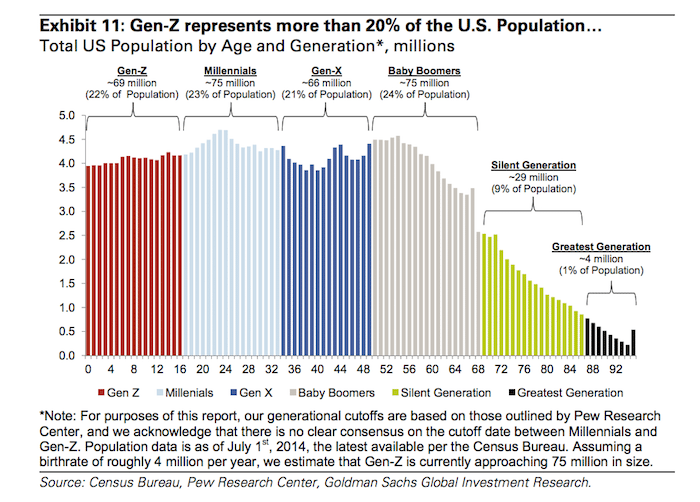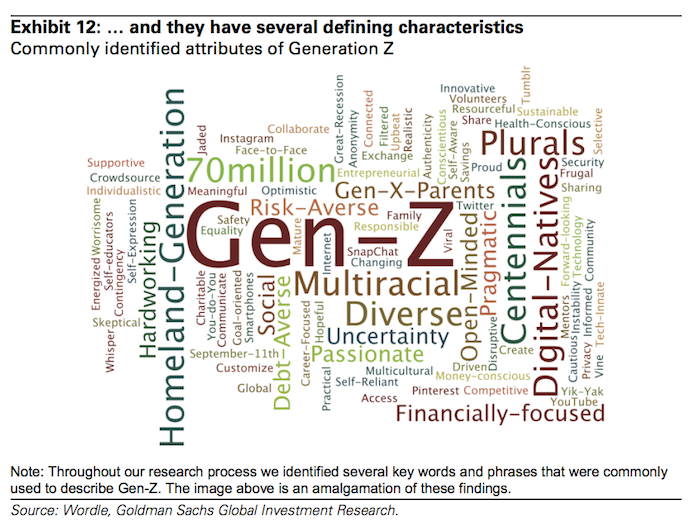Skift Take
Even though most of Generation Z is still in school, smart hospitality brands are already marketing to this highly influential group of future hotel guests to generate loyalty.
In an increasingly competitive hospitality space, it pays to be well ahead of the game when it comes to cultivating loyal customers—even if some of them might still in the womb.
While the U.S. lodging industry is focused heavily on catering to millennials with more personalized and customized experiences for loyalty guests, as well as spending an estimated $6.4 billion in 2015 on capital expenditures to improve amenities and services like tech upgrades, better Wi-Fi connectivity, and new food concepts, they should be thinking about generation Z, too.
Members of generation Z, generally defined as those born after 1995, share some characteristics as their millennial counterparts, but they are not the same. Members of this generation are true digital natives, and they are often described as being more pragmatic, more cautious, more money-conscious, and more globally minded than their predecessors.
The eldest members of generation Z are now in their sophomore year of college. While they’re just beginning to demonstrate their economic influence, their sheer numbers—70 million and counting—and estimated spending power—$200 billion annually when you consider their influence on parental and household purchases, according to Mintel—make them incredibly important to marketers in every industry, including hospitality.
In November, Goldman Sachs analysts issued a note to clients saying that while there’s been a lot of focus on millennials in the media and investment community, generation z might actually be even more significant.
“Over the past several years, educators, employers, researchers, retailers and the like have spent significant time and resources dissecting the millennial mindset. But the time has already come to focus to gen Z, which promises to be just as, if not more, influential,” the analysts noted.
But is it too early to start building brand loyalty with this consumer group? Not at all.
In fact, a 2015 study about generation Z from Cassandra Report shows that 77 percent of generation Z consumers feel it’s important for brands to reach out to them with offers, promotions, and messaging. Additionally, 32 percent of younger consumers from around the world say there are brands to which they will always be loyal, although 23 percent of millennials said they would cut ties with brands if they received poor customer service.
“Age is irrelevant,” Melanie Shreffler, senior editorial director at Cassandra Report, tells Skift. “They already have money of their own and even if they aren’t doing the actual booking, they are highly influential. Never underestimate them and their needs. Know that their parents treat them as young adults from an early age, and they see themselves as that. Welcome them as just another consumer, and think about those motivations. They’re highly tech-focused, and they value individuality. The companies that recognize them specifically, and talk to them will matter.”
Brands in the travel space are especially desirable to this generation, too. For generation Z, travel isn’t a luxury—it’s more of an essential. “Believe it or not, 42 percent of 14 to 18 year-olds say that travel is something they need to feel like their life is complete. That’s very high, and very much in comparison with generation Y (47 percent),” she notes.
When generation Z begins traveling on their own, they view it as a major milestone. “For them, traveling becomes a marker of adulthood,” says Shreffler. “Seventy-seven percent of 14 to 18 year-olds say that traveling without supervision is a marker of adulthood—and 42 percent of those teens feel like they are adults. That’s a significant number.”
Although they may not be using their credit cards to pay for their family vacations, generation z has a tremendous amount of influence on family travel decisions. “Maybe an eight-year-old isn’t doing the exact booking, but you’d be surprised to know how many parents ask them to weigh in,” adds Shreffler.
According to the Gen Z study from Cassandra Report, 84 percent of those ages seven to 17 hold an influence on the family’s overall spending. “When it comes to family vacations and travel, 32 percent of parents say their kids hold a lot of influence on vacations and spending, and 54 percent of parents say kids have some influence,” she says.
So, how should travel companies begin building brand awareness and loyalty with generation Z?
“Generation Z is brand loyal up to an extent,” says Shreffler, “but because they’re so good with technology, they feel like they can always find another brand that is doing something better.” To build lasting brand loyalty, you have to “speak to who they are as consumers and what they need.”
Courting Them with Creative Content
Generating visual content that’s meaningful, memorable, and entertaining is key to reaching generation Z, and already, some brands are doing just that. The Marriott Content Studio, for example, recently released the second installment of its Two Bellmen short film, engaging online audiences with its slick, energetic, and youthful approach to storytelling.
An even more effective use of content, notes Shreffler, is inviting generation Z consumers to be part of the creative process. “They want to share what they are doing,” she explains. She cited examples of brands like Lego and J.Crew which have enabled kids to be a part of the brand’s dialogue—Lego with its Lego.com Community Messaging Boards and J.Crew’s hiring of four-year old Instagram star Mayhem to design an entire kids’ collection.
Hotel brands are also increasingly looking to visual social media platforms like Snapchat as another way to engage with younger guests. As early as 2014, Marriott was the first hotel brand to launch a full marketing campaign on Snapchat, choosing four influencers to co-create content on the highly visual social media platform. In October, W Hotels introduced a new Snapchat Geofilters campaign that allowed all Snapchat users—numbering more than 100 million around the world—to create cheeky travel postcards that say “You Wish You Were Here,” “Current Situation,” and “Auto Reply: 000,” all with the W Hotel logo.
“We’re absolutely thinking about all customer segments,” says Mark Weinstein, global head of customer engagement, loyalty, and partnerships at Hilton Worldwide. “We may not be thinking of gen Z as consumers and travelers just yet, but they are starting their travel experiences earlier, and they’re more sophisticated and worldly and at an age when others before them haven’t been.” Weinstein says Hilton is focused on “creating compelling content that we push through all different kinds of channels, especially social media.”
A spokesman for Marriott tells Skift, that the company recently “kicked off exploratory research on what we call Gen We—focusing in particular on their relationship to brands.”
Shreffler recalls meeting a 10-year-old last year who was involved in Cassandra Report’s Gen Z research, and noting how knowledgeable she was about different consumer brands. “She talked about how she loved to put stuff out on social media and then she said, out of the blue, ‘The coolest thing ever would be for a brand that I like to just recognize it, or spoke directly to me.’ She’s just a little girl, but just knowing that a brand recognized her was hugely important to her.”
But brands have to be careful about how they use content, says Jeff Fromm, president of FutureCast, a Barkley consulting firm that specializes in millennial marketing. “I think social media marketing is on the decline,” he says. “I don’t think social media is on the decline, though. The marketing can’t be inauthentic and too promotional in nature. Younger consumers are looking to their peers for ideas, and for ways to express themselves. They’re open to receiving brand messages, but the key is in authenticity.”
“The way gen Z approaches ads overall is very different,” says Shreffler. “They really appreciate branded content, as long as it’s entertaining, funny, and has good music. Ads, for them, are more of a source of entertainment and less a source of disruption and annoyance. When ads aren’t relevant to them, that’s an annoyance. They’ll seek out branded ads and share them with their friends. They can be your biggest advocates and be your biggest critics at the same time.”
Focusing on 24/7 Tech and Memorable Experiences
As hotel owners continue to invest in their properties at record levels—7 percent more than they did last year according to New York University’s Tisch Center for Hospitality and Tourism—a large chunk of those investments involve technology: having the best Wi-Fi, putting smart TVs in rooms, enabling digital room keys, and even dispatching robot butlers.
Hilton’s Weinstein says the company is especially focused on mobile technology to reach all of its guests. “Across all segments, mobile is so important. It gives our guests more personalized choices and control. Being high-touch and high-tech are both important, especially as we think of both millennials and gen Z.”
Technology, says Fromm, plays a big part in the overall customer journey. “Hotels need to create technology that’s extremely useful; millennials and generation Z value innovation. You can create a better customer journey with content that engages, inspires, and informs, and technology that makes life easier. It’s about creating a frictionless customer journey and collecting experiences.”
The use of mobile messaging apps like Facebook Messenger and WhatsApp is another way hotels are trying to cultivate frictionless travel experiences—and building loyalty among guests of all ages. Hyatt, for example, is using Facebook Messenger and WeChat to communicate with its guests, and Starwood has been using WhatsApp since last year. Marriott is expanding its Mobile Requests service as well for its Marriott Rewards members.
When it comes to gen Z, experiences tend to trump products. “Among seven to 17 year-olds, 60 percent would rather have a cool experience whereas 40 percent would rather have a cool product,” says Shreffler, citing data from Cassandra Report’s 2015 Ages & Stages paper. “If hotels create experiences that are special, and package them as part of a loyalty program, it creates a cost-benefit analysis for them that they can get behind.”
She adds, “Gen Z is a savvy consumer and they know how to do their research. They need to know you are getting the best overall deal from you—not just in terms or price—but you have to give them a reason to pay a little more. If you can give them special experiences hat have a higher cache than dollar value, that can drive loyalty.”
Individualization over Personalization
Beyond offering a personalized guest experience through their loyalty programs, as most hotels are attempting to do today, to really build loyalty with generation Z, individualization is key, says Fromm.
“Loyalty is going to move from customization and personalization to individualization,” he explains. “It will be defined by machine learning where people get exactly what they need, when they need it. There will be algorithms that will understand your behaviors.”
Right now, the more hospitality brands treat members of generation Z like individuals—the more likely they’ll remember you, says Shreffler. She cites the Trump SoHo New York, which launched its own Young Entrepreneurs program in 2013, as an example. The program, for guests ages three to 17, includes personalized business cards, complimentary meals, and a monogrammed robe—to give them a taste of what’s it’s like to travel as a member of the C-suite.
“It was a level of experience they weren’t going to get anywhere else,” she says. “They won’t forget that kind of attention—being treated like individuals, or being spoken to like young people. They pick up on that at a very young age. The brand is treating them just like a grown-up, and that really resonates.”
Have a confidential tip for Skift? Get in touch
Tags: generation z, hotel, loyalty, marketing
Photo credit: Generation Z includes those born since the late 1990s.

